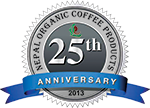Introduction to Coffee
Coffee is a globally prestigious, non-alcoholic beverage and is often regarded as an intellectual tonic—boosting focus, creativity, and energy. Since its discovery in Ethiopia around 850 AD, coffee has become a daily ritual for billions. It is the second most traded commodity in the world after petroleum. Brazil leads in production, the USA in consumption volume, and European countries in per capita use.
Nepal, with its diverse altitudes ranging from 60 to 8,848 meters and rich agro-climatic zones, is naturally suitable for high-quality coffee cultivation. Coffee was first introduced in 1995 BS by Mr. Hira Gire in Gulmi district from Burma. However, it remained mostly ornamental until 2033 BS, when it was identified as a potential cash crop, sparking government-supported cultivation.
Madanpokhara in Palpa district emerged as the pioneer of organic coffee in Nepal. The Ghimire family, particularly Mr. Dhakeswor Ghimire, initiated commercial coffee farming in 2035 B.S. After their land was damaged by floods in 2038 BS, they shifted from cow farming and maize to coffee, planting in agroforestry models that utilized compost, cow dung, and urine—avoiding the use of chemical fertilizers and pesticides.
By 2046 BS, they started producing and selling Nepal’s first homemade organic filter coffee. This attracted attention from national and international stakeholders. Government officials and institutional leaders visited the Ghimire farm, leading to valuable technical and moral support.
In 2047 BS, the Nepal Coffee Producers Association (NCPA) was established in Madanpokhara, Palpa. In 2048 BS, it expanded to the district level with Mr. Dhakeswor Ghimire as the founding president. By 2054 BS, NCPA had initiated national-level training on organic coffee production, conducted by Mauricio Salinas (Coffee Agronomist) and Paul Katzeff (Coffee Roaster) from El Salvador and the United States. In 2049 BS, the National Tea and Coffee Development Board was established at the request of the NCPA, initiated by the late Agriculture Minister Ram Chandra Paudel. The government’s Coffee Policy of 2060 BS further strengthened the movement by officially promoting organic coffee production and processing.
Today, NCPA includes 15 districts and over 30,000 members. Organic coffee in Nepal is now cultivated at mid-hill altitudes (800–1600m) under shade using traditional and organic methods—making Nepali coffee a unique, eco-friendly, and growing industry.



